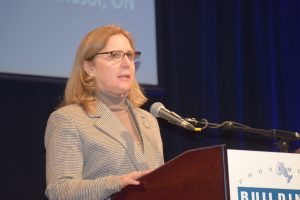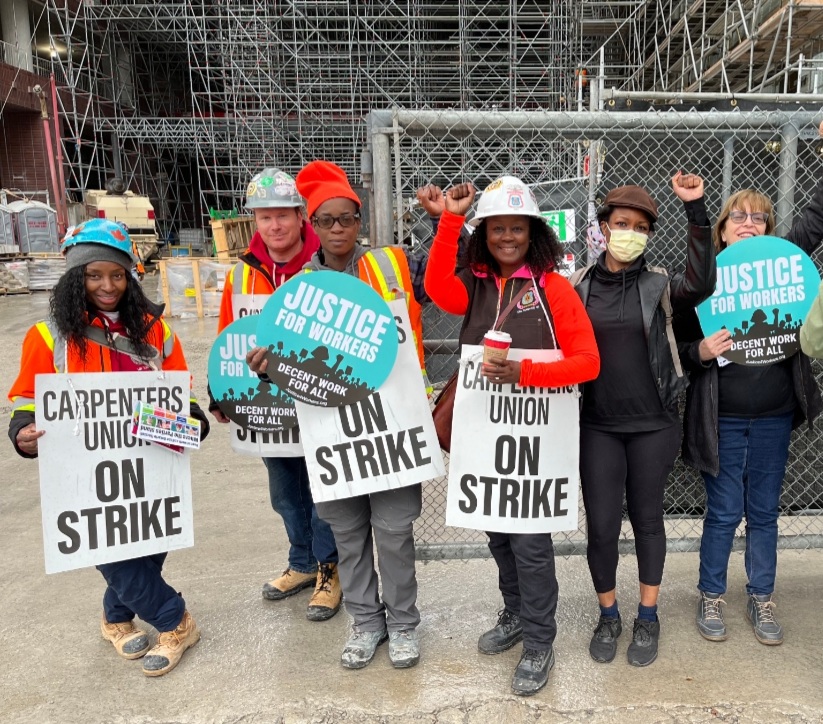Union and employer negotiators in Ontario’s ICI sector will be looking to avoid the disconnect that struck the sector hard in 2022 as the next round of contract negotiations fast approaches.
During that cycle there were five ICI strikes and nine times the rank and file voted to reject proposed settlements negotiated between their union leaders and the contractor associations.
This time around, the teams will have a new resource – the results of a comprehensive survey of the trades and contractors conducted by the (OCS) in the aftermath of the difficult bargaining season last time around.
Contracts to expire April 2025
By law ICI contracts last three years in Ontario with the current deals negotiated by the 25 Ontario ICI construction trades set to expire at the end of April 2025.
OCS director of research Katherine Jacobs said she is aware of some negotiating partners already launching the early stages of negotiations.
“It’s important to plan, and it’s important to start early,” said Jacobs.
CECCO) executive director Wayne Peterson and business manager Marc Arsenault published a joint statement in July 2022 indicating their organizations would be working with the OCS to develop the post-bargaining exit survey.
Jacobs said she was reluctant to talk about the survey results, which are confidential, or the internal strategies being developed by the negotiators as a result of the survey of more than 100 stakeholders.
But external factors are obvious — how the rising cost of living and tight labour market played an increasing role in bargaining as the weeks passed after the first deal was ratified in the electrical sector in February 2022.
Each month, inflation kept creeping higher. Statistics Canada announced a 5.1 per cent spike for January, 5.7 per cent for February, 6.7 and 6.8 for March and April respectively, and 7.7 per cent for May. It became clear some early wage settlement milestones were deemed inadequate later on.

The electrical sector announced the first ratified deal in February, with workers settling for an 8.6 per cent wage increase over three years with an escalator clause based on other wage settlements.
A high-water mark came April 30, when steeplejacks ratified a deal that contained a three-year wage hike of 14.7 per cent.
“It was a unique circumstance,” said Jacobs. “Was it sort of an anomaly given the combination of economic factors, the pandemic, a reaction to that, or was there something else going on?
“I’m not sure we still know the answer to that question. I personally think it was a lot driven by what was going on at the time in the economy.”
Among the topics addressed, stakeholders were asked about their preparation processes, how they interacted with their own committees, how they interacted with their counterparts on the opposite side, and how they view their relationships with their bargaining opponents.
Did they think, Jacobs recounted, that their relationship needs to change or improve?
Relationships are good says Jacobs
The OCS urges stakeholders to maintain strong relationships with bargaining counterparts on an ongoing basis, Jacobs said, and in general relationships are good, with lots of trust.
“I think certainly all of our stakeholders are interested in learning from that round of bargaining, to see how they improve the next round,” she said. “The vast majority of them are just talking about building their relationships.”
Preliminary results from the survey were presented to key labour-management personnel in June of 2023 and there have been other presentations since then. There will be a discussion of lessons learned and analysis by a panel at the OCS annual meeting in October.
The OCS prepares a package of resources for each bargaining season and the stakeholder survey report will be a key element this time around. Jacobs said the OCS is preparing its resources earlier than usual for this bargaining session.
A June 2022 CECCO newsletter observed there was heightened activity on social media from workers during the bargaining season, and Jacobs acknowledged there had been a lot of talk about challenges with social media. She said the OCS will encourage discussions about social media and broader communications during its AGM in October.
Jacobs said the survey did not explore the gulf between workers and union leaders that led to so many unratified proposed agreements. Overall, she said, “there is room for improvement” in the whole process.
Follow the author on Twitter @DonWall_DCN.




Recent Comments
comments for this post are closed